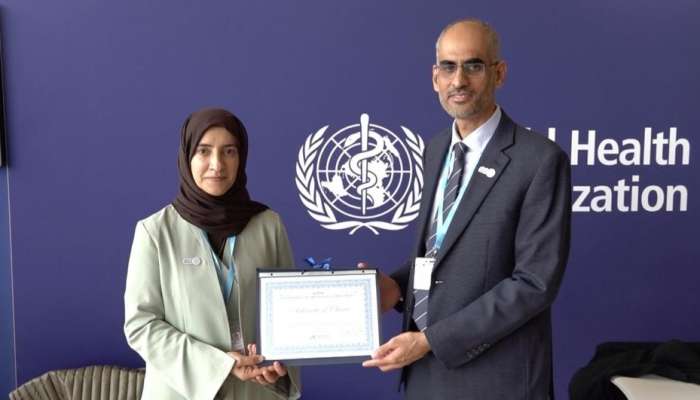
Geneva: The Sultanate of Oman has been awarded a validation certificate by the World Health Organization (WHO) for eliminating industrially-produced trans-fats from food products.
This milestone reflects the country’s strong commitment to improving the quality of life, consolidating preventive healthcare and augmenting public health indicators in line with the strategic objectives of Oman Vision 2040, which aspires to elevate the nation to the ranks of developed countries, with health as a top priority.
The certificate was officially presented today during the 78th World Health Assembly (WHA), currently being held in Geneva, Switzerland, from 19 to 27 May.
The Sultanate of Oman’s delegation was headed by Dr. Hilal Ali Al Sabti, Minister of Health.
In a press statement, Al Sabti said, “The elimination of trans-fats constitutes a milestone in our commitment to promote and protect community health. Oman takes pride in being among the nine leading countries globally and the second country in the Arab world to implement this life-saving policy of eliminating this harmful ingredient.”
Oman’s official delegation will be engaged in WHA78’s key issues that address the proposed programme budget for the 2026–2027, as well as the role of the Global Coordination Mechanism on the Prevention and Control of Non-communicable Diseases (NCDs) in supporting WHO’s efforts to engage multiple stakeholders in combating NCDs.
The discussions also cover mental health and social connectivity, along with various global strategies and action plans scheduled to be implemented with effect from next year. These include the Comprehensive Implementation Plan on Maternal, Infant and Young Child Nutrition (2021–2025), the Global Strategy for Women’s, Children’s and Adolescents’ Health and the Global Strategic Directions for Nursing and Midwifery (2021–2025).
The Assembly is further addressing the critical issue of antimicrobial resistance. It also is reviewing progress made by the Intergovernmental Negotiating Body responsible for drafting and negotiating a convention, agreement, or other international instrument under the Constitution of the WHO to strengthen pandemic prevention, preparedness and response.
The meeting will cover integrated emergency, critical and surgical care to achieve universal health coverage and protection from health emergencies. It will also address substandard and falsified medical products, as well as global strategies and action plans due to expire within one year, in accordance with the Global Strategy for Digital Health 2020-2025.